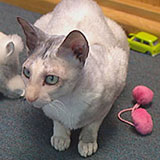Cornish Rex
Breed: Cornish Rex
Temperament: affectionate, active
Cost: $300-$400
Lifespan: 12-15 years
Maintenance: low
Recommended for: families
Appearance
The Cornish Rex is known for its alien-like appearance and its extremely short fur. Its tightly curled short-haired coat is actually a display of the cat’s secondary guard hairs. This breed does not have the outer primary coat found on most other cat breeds. Described as a Marcel wave, the coat appears like thick corduroy stripes and is very soft. The down hairs are wavy and reduced in length. Even the Cornish’s eyebrows and short whiskers are crinkled. They have large ears set high on a fine boned head. Their skinny arched back and long legs add to their alien appearance.
Colours: White, Cream, Blue and White, Tortoiseshell, Torti and White Van, Cinnamon Silver, Point Si-Rex.
Origins
The Cornish Rex breed is said to result from breeding from a cat with a genetic abnormality that affected the way its coat grew. There are several animals which have the short, crinkled coat seen in the Cornish Rex including the Rex rabbit and the Devon Rex Cat.
According to Cornish Rex breeders the first Cornish Rex was a kitten called Kallibunker. The kitten was one of a litter of domestic cats, born in 1950 in Cornwall, England. Kallibunker was the only kitten in the litter with this genetic abnormality. By crossing the Rex cats with other short-haired breeds including Siamese the distinctive Cornish Rex breed was developed and is now known around the world. It came to Australia in the 1970s.
Temperament
The Cornish Rex cats are affectionate, alert and active. They are athletic, agile and love to jump and play. Cornish Rex cats may use their paws to pick up objects and throw them around and have been known to play fetch with their owners. Owners say these cats never stop and although they love to be around people Cornish Rex cats will often choose play over cuddles.
Health and lifespan
Despite its delicate appearance the Cornish Rex is a hardy and robust breed. They do not experience any unusual or significant health problems and should live to 12-15 years. Due to their short coat these cats may not be comfortable outdoors on cold or wet days as they do feel the cold.
Grooming and care
As a short-haired cat the Cornish Rex needs minimal grooming. Owners tend to stroke the cats firmly from head to tail. This emphasises the distinctive wavy pattern of the hair. Dead hair can be removed with a quick brush or comb. Cornish Rex are more of an indoor cat and due to their short, thin coat will need to be kept warm in cooler weather. Indoors they need lots of toys and playthings, especially cat scratch poles, to keep them busy and to keep them away from furniture.
Diet
Cats should be fed a balanced diet of good quality cat biscuits, cat food and some raw meat. Include chicken necks or wings in their diet to help keep teeth healthy and have clean drinking water available.
Cost and availability
Expect to pay around $300 to $400 per animal. Cornish Rex cats are not widespread so may be hard to find (to contact breeders or cat associations see ‘More information’ below).
Recommended for
Cornish Rex are suited to owners who want an active cat that remains active for the duration of its life. It is a great breed for families and will play with children. Because they enjoy life inside the Cornish Rex is suitable for apartments, but make sure you have lots of toys and a good scratch pole to keep them occupied.
Many people promote the Cornish Rex as a hypo-allergenic cat breed. This claim is not true, although it has been reported that some people who suffer from cat allergies do not experience a reaction to the Cornish Rex. Although the Cornish Rex has very short fur that is not readily shed, it is the dander (dead skin flakes) and saliva that causes most cat allergies and these are still present in the breed.
More information
We filmed our segment with Sue and Belinda Marshall of Coslinkar Cattery, Sydney; phone: (02) 9601 1483. Sue is also a contact for the Rex Cat Society of NSW.
If you would like more information or to find breeders in your area contact your local cat society:
ACT
Capital Cats Inc.
PO Box 124
Mitchell, 2911
Phone: (02) 6231 6538
Website: www.hotkey.net.au/~ccca/index.htm#cccaindex
QLD
Queensland Feline Association
8 Cooper Road
Northgate, 4013
Phone: (07) 3260 6575
Email:[email protected]
NSW
The New South Wales Cat Fanciers’ Association Inc.
PO Box 5699
South Windsor, 2756
Phone: (02) 4587 8789
Email:[email protected]
SA
Feline Association of South Australia Inc.
PO Box 736
Murray Bridge, 5253
Phone: (08) 8532 3314
TAS
Cat Control Council of Tasmania
85 McKenzies Road
Leslie Vale, 7054
Phone: (03) 6239 6449
VIC
Feline Control Council of Victoria Inc.
Royal Showgrounds
Epsom Road
Ascot Vale, 3032
Phone: (03) 9281 7404
Email:[email protected]
WA
Cat Owners Association of Western Australia Inc.
PO Box 135
Claremont, 6010
Phone: (08) 9384 2500



